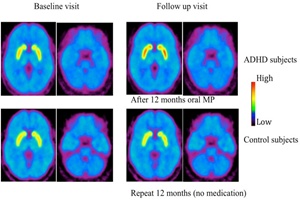Long-term ADHD treatment increases brain dopamine transporter levels, may affect drug efficacy
28 May 2013
Long-term treatment of attention deficit/hyperactivity disorder (ADHD) with certain stimulant medications may alter the density of the dopamine transporter, according to research published on 15 May in the open access journal PLOS ONE by Gene-Jack Wang and colleagues from Brookhaven National Laboratory and the intramural program at NIH.
 ADHD is commonly treated using drugs to target dysfunctional dopamine signaling in the brain, such as methylphenidate (commonly known as Ritalin). The researchers found that adults with ADHD who had been prescribed the drug methylphenidate for a period of 12 months had a 24 per cent increase in the density of the dopamine transporter in some brain regions, which after treatment was significantly higher than in adults without ADHD who had not been treated with the drug.
ADHD is commonly treated using drugs to target dysfunctional dopamine signaling in the brain, such as methylphenidate (commonly known as Ritalin). The researchers found that adults with ADHD who had been prescribed the drug methylphenidate for a period of 12 months had a 24 per cent increase in the density of the dopamine transporter in some brain regions, which after treatment was significantly higher than in adults without ADHD who had not been treated with the drug.
Prior to the 12-month treatment, there were no significant differences in the two groups' dopamine transporter levels. The authors conclude that the elevated dopamine transporter density, suggested by some as a biological test for diagnosis of ADHD, may be a consequence of chronic treatment rather than a marker for the disorder. These findings may offer an explanation for discrepancies in the literature describing dopamine transporter levels in ADHD patients, as differences in dopamine transporter levels in the brain may be due to differences in prior treatment.
Many studies have shown that an acute increase in dopamine signaling while on methylphenidate treatment can improve ADHD symptoms in the short term, but this is the first study to analyse the long-term effects of treatment.
Dr Gene-Jack Wang of Brookhaven Lab and Stony Brook University, lead author on the paper, says, "It's really important to understand the biochemical effects these drugs have on the brain so we don't mistake an effect of the drug as a marker for the disease. I'm not saying that's definitely the case here, but it could be. Fortunately, our neuroimaging tools allow us to study these questions. The results from this study point to the need to further investigate this question."


















